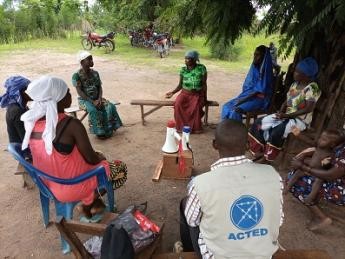The Democratic Republic of Congo is riddled by food insecurity, armed conflicts, population displacement and endemic poverty.
Since August 2020, ACTED has been providing food aid to vulnerable people in the territories of Manono and Nyunzu, in the province of Tanganyika, with the support of the US Agency for International Development and Concern. ACTED’s priority is to facilitate access to food and livelihoods, especially for vulnerable women, in order to improve their living conditions and security in a sustainable manner.
In the South-East of the country, hunger is gaining ground
The southeast of the country, including Tanganyika province, is facing a situation of severe food insecurity that seems to be deteriorating year after year. Since 2012, the people of Tanganyika have been facing repeated conflicts and displacements, which have only made the food insecurity situation in the area worse. Conflicts most often result in the destruction and looting of land. The populations, forced to flee for safety, often lose all their possessions. Repeated displacement leaves them in an increasingly precarious situation. Tanganyika is one of the provinces with the largest number of displaced people in the Democratic Republic of Congo.

Fighting against food insecurity by training farmers
ACTED teams have distributed agricultural kits containing seeds and market gardening kits to more than 4,900 families. This distribution took place at a given time so that it is possible to sow at the most favourable period for an efficient yield. For this, ACTED has provided trainings on cultivation techniques, production of natural insecticides, fungicides and conservation and storage techniques of agricultural products.
Conducting studies for an adapted humanitarian aid
In order to ensure that the aid provided has a sustainable impact, ACTED carries out market analyses in order to establish a list of the most common and highest potential income-generating activities in the area, so that everyone can choose what corresponds to their needs and capacities. Another survey focused on the priority food needs and the main non-food needs in the area, such as cooking pots and tarpaulins.